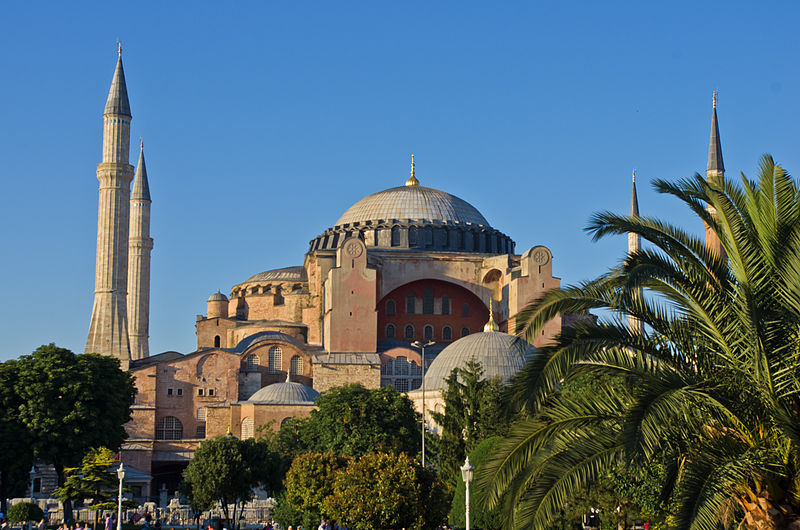Turkey Converts Hagia Sophia to Mosque
Robert Jones/Gatestone Institute/November 09/16
This is how the minds of Islamic supremacists seem to work: If you want churches to remain churches, it means you are “disturbed by the Koran or Islamic prayers,” and you disrespect or “insult” Islam. According to Islamic scriptures, those who “insult” Islam or its prophet Muhammad are to be executed.
So if one wants to survive under Islamic rule, one has to submit to Islam and accept one’s own inferior status. There is apparently no place for diversity or civilized, equal coexistence of Muslims and non-Muslims in Islamic nations.
“I can only think of one reason [to turn Hagia Sophia into a mosque]. As a shout of Islamic triumphalism. What a mistake that would be. Christians would rightly consider it an intentional insult. The international community would see it as an open rejection of its diversity agenda. Moreover, I think that a relatively secular Turkey acting so radically would demonstrate to the world that despite moderate Muslims’ many assurances to the contrary, contemporary Islam is intolerant in outlook, belligerent toward non-believers, and dangerously hegemonist in its intentions.” — Wesley J. Smith, author.
The West did not protect Anatolian Christians during the 1914-1923 genocide. It does not seem as if the West will protect Europe against what seems to be the current bloodless Muslim invasion, either.
The process of converting the historic Hagia Sophia church-then-museum in Istanbul into a mosque, in the works for the past three years, now seems to have been finalized.
In 2013, the deputy prime minister of Turkey Bulent Arinc at the time, while speaking to reporters, signaled that Hagia Sophia Museum would be used as a mosque.
“We currently stand next to the Hagia Sophia Mosque … we are looking at a sad Hagia Sophia, but hopefully we will see it smiling again soon,” Arinc said during the opening ceremony of a new Carpet Museum, located next to the ancient Hagia Sophia, the Turkish newspaper Hurriyet had reported.
The pro-government Turkish newspaper Sabah ran a story on June 1, 2016 entitled, “Historic Moments at Hagia Sophia. The longing is about to be over!… The mosque of Hagia Sophia will witness historic moments in the month of Ramadan…”
The Greek Foreign Ministry reacted with a written statement: “Obsessions, verging on bigotry, with Muslim rituals in a monument of world cultural heritage are incomprehensible and reveal a lack of respect for and connection with reality.” The ministry added that the practice contradicted the values of modern, democratic and secular societies.
The Turkish Foreign Ministry Spokesperson, Tanju Bilgic, responded in a written statement on June 8:
“The Greek Foreign Ministry’s statement with regards to TRT Diyanet TV’s suhur program entitled ‘Hagia Sophia at the time of abundance,’ which will be broadcast throughout the month of Ramadan, is unacceptable”.
Pro-government Turkish media interpreted the criticism of the Greek ministry of foreign ministry as follows: “They have been disturbed by the reciting of the Koran at Hagia Sophia.”
This is how the minds of Islamic supremacists seem to work: If you want churches to remain churches, it means you are “disturbed by the Koran or Islamic prayers”, and in so doing, you disrespect or “insult” Islam — and according to Islamic scriptures, those who “insult” Islam or its prophet Muhammad are to be executed.
So if one wants to survive under Islamic rule, one has to submit to Islam and accept one’s own inferior status. There is apparently no place for diversity or civilized, equal coexistence of Muslims and non-Muslims in Islamic nations.
In the meantime, the Hellenic American Leadership Council has begun a campaign to ask the United States Commission on International Religious Freedom (USCIRF) to issue a statement against the creeping conversion of Hagia Sophia into a mosque, writing:
In 2014, USCIRF condemned attempts by Turkey’s parliament to change the status of Hagia Sophia from a museum to a mosque. In its statement at the time, USCIRF said “…opening Hagia Sophia as a mosque would clearly be a divisive and provocative move. It would send the message that the current government sees the sensitivities of Turkey’s religious minority communities, particularly its ancient Christian community, as being of little or no consequence.”
Instead of following USCIRF’s recommendations, Turkey ignores them, apparently now choosing a path of “creeping conversion” to alter the status of this historic site.
However, all of the criticisms, calls and campaigns do not seem to have worked. A few months after a decision by Turkish authorities to allow readings from the Koran to be broadcast from Hagia Sophia in Istanbul, Turkey has now decided to appoint a permanent imam for the site.
According to the state-funded Anadolu News Agency, Turkey’s Directorate for Religious Affairs (Diyanet), and the mufti of the Fatih district, have agreed to assign a permanent imam who will lead five daily Islamic prayers at the Hagia Sophia, instead of the current two.
The Hagia Sophia in Istanbul was the grandest cathedral in the Christian world, until it was captured and converted to a mosque by the Muslim Ottoman Turks in 1453. The Turkish Republic converted the Hagia Sophia to a museum in 1935, and Turkey’s current Islamist government is now converting it into a mosque. (Image source: Antoine Taveneaux/Wikimedia Commons)
According to the 2015 statistics of Diyanet, there are 3317 mosques in Istanbul and 86,762 in Turkey. There is no shortage of mosques in the country. So why is the Turkish government converting Hagia Sophia into a mosque?
“I can only think of one reason,” writes the author Wesley J. Smith.
“As a shout of Islamic triumphalism. What a mistake that would be. Christians would rightly consider it an intentional insult. The international community would see it as an open rejection of its diversity agenda. Moreover, I think that a relatively secular Turkey acting so radically would demonstrate to the world that despite moderate Muslims’ many assurances to the contrary, contemporary Islam is intolerant in outlook, belligerent toward non-believers, and dangerously hegemonist in its intentions.”
“Constantine,” writes the scholar Nikolaos Provatas, “chose as the location of his new capital the ancient Greek city of Byzantion. In 324 Constantine transformed Byzantion into ‘The New Rome’ or ‘Constantinopolis’, the City of Constantine. The people often referred to it simply as ‘The City’ or, in Greek, ‘Hi Polis’.
“Christianity was also to form the strongest cohesive glue that bound the peoples of the Eastern Roman Empire, regardless of their language and ethnic origin. To the inhabitants of the Eastern Roman Empire, the words ‘Romaios’ -Roman- and ‘Christian’ were often synonymous.”
The Church of the Holy Wisdom, known as Hagia Sophia, designed to be the major basilica of the Byzantine Empire and a masterpiece of Byzantine architecture, was built in the city by Justinian I in 532-537 CE.
When Constantinople was invaded and captured by the Ottoman Sultan Mehmed II in a bloody military campaign in 1453, it brought an end to the Byzantine Empire.
Steven Runciman, in his book, The Fall of Constantinople 1453, writes that congregants and refugees became spoils — to enslaved, violated or murdered. The church was desecrated and plundered, the infirm and elderly were slaughtered, women and girls were raped and the rest sold into slavery.
Mehmed II then converted Hagia Sophia church into a mosque.
The name Constantinople was changed to “Istanbul” in 1930 by republican Turkey, and Hagia Sophia converted to a museum in 1935.
Today, there is no sizeable Christian community in Turkey to oppose the ongoing oppression and tyranny. From the great Christian Byzantine Empire, now less than 0.2% of Turkey’s 80-million population is Christian.
This is the result of the genocide of Greek Christians by Ottoman Turks from 1913-1923 — the annihilation of the majority of Greek Christians in Constantinople and Anatolia, in what was the heart of Christendom before the Islamic invasion.
“The decision for the genocide against Greeks,” wrote the scholar Theofanis Malkidis, “was taken by the Young Turks (Cemal, Enver and Talat pasha) in 1911, was put into practice during the World War I and was completed by Mustafa Kemal (1919 – 1923).
“The persecutions were originally appeared in the form of cases of violence, destruction, deportations and exiles. Soon though, they became better organized and extensive and turned massively against the Greeks (and against the Armenians).”
As a result of centuries-long campaigns of violent jihad and cultural jihad, the Christians of Anatolia and Constantinople were exterminated. The West did not protect Anatolian Christians during the 1914-1923 genocide. It does not seem as if the West will protect Europe against what seems to be the current bloodless Muslim invasion, either.
Today, other remaining churches in Turkey are also targeted and converted to mosques. And the West is still silent, submissive and bowing to jihadists for its own ill-informed and misguided agenda.
*Robert Jones, an expert on Turkey, is currently based in the UK.
© 2016 Gatestone Institute. All rights reserved. The articles printed here do not necessarily reflect the views of the Editors or of Gatestone Institute. No part of the Gatestone website or any of its contents may be reproduced, copied or modified, without the prior written consent of Gatestone Institute.

















